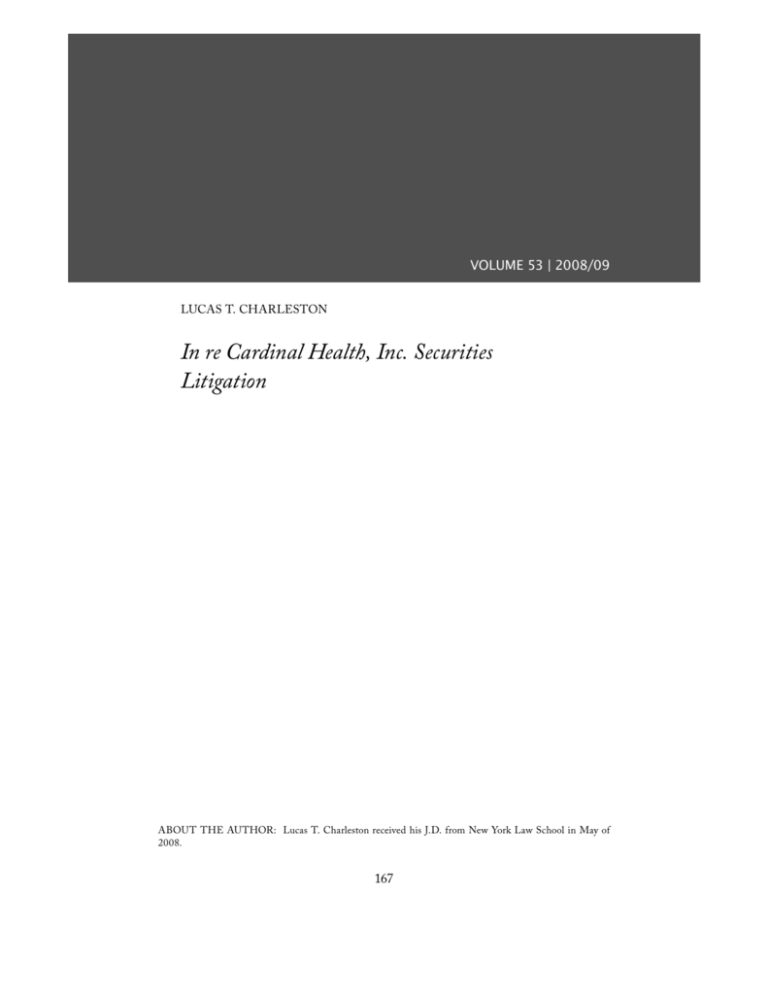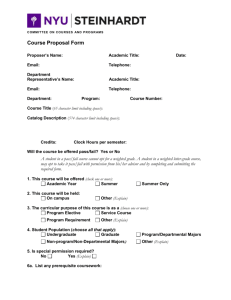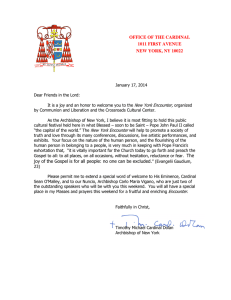In re Cardinal Health, Inc. Securities Litigation
advertisement

VOLUME 53 | 2008/09 LUCAS T. CHARLESTON In re Cardinal Health, Inc. Securities Litigation ABOUT THE AUTHOR: Lucas T. Charleston received his J.D. from New York Law School in May of 2008. 167 Evidentiary privileges that protect parties against the discovery of confidential information by adversaries are sacrosanct. Of equal importance, however, are the limitations on those privileges. The work-product doctrine is an evidentiary privilege that generally precludes the discovery of “mental impressions, conclusions, opinions, or legal theories” of an attorney that are prepared “in anticipation of litigation.”1 Generally, courts have found that a party’s disclosure of work product to an adversary constitutes a general waiver of the privilege.2 Because a party has chosen to gain some advantage by disclosing work product to an adversary, the need to protect “mental impressions, conclusions, opinions, or legal theories” from an adversary’s intrusion disappears.3 But in the context of government investigations of corporate malfeasance, some jurisdictions have recognized the doctrine of selective waiver as a narrow exception to a general waiver.4 Selective waiver allows a party in certain circumstances to waive the work-product privilege as to the government but to maintain the privilege as against subsequent private litigants.5 The jurisdictions that have recognized selective waiver have set stringent standards for when the narrow 1. See United States v. Adlman, 134 F.3d 1194, 1195–96 (2d Cir. 1998) (citing Fed. R. Civ. P. 26(b)(3)) (“The work-product doctrine . . . is intended to preserve a zone of privacy in which a lawyer can prepare and develop legal theories and strategy ‘with an eye toward litigation,’ free from unnecessary intrusion by his adversaries.”). The work-product doctrine has been codified in the Federal Rules of Civil Procedure, which provides in relevant part: [A] party may not discover documents and tangible things that are prepared in anticipation of litigation or for trial by or for another party or its representative (including the other party’s attorney, consultant, surety, indemnitor, insurer, or agent) . . . [unless] the party shows that it has substantial need for the materials to prepare its case and cannot, without undue hardship, obtain their substantial equivalent by other means. Fed. R. Civ. P. 26(b)(3). 2. See, e.g., In re Qwest Commc’ns Int’l, Inc., 450 F.3d 1179, 1186 (10th Cir. 2006) (finding target of government investigation waived work-product privilege by disclosing work product to government agencies); In re Steinhardt Partners, LP, 9 F.3d 230, 235–36 (2d Cir. 1993) (finding target of government investigation waived work-product privilege by disclosing work product to government agencies); In re Leslie Fay Companies, Inc., 152 F.R.D. 42, 44 (S.D.N.Y. 1993) (finding audit committee of corporation subject to government investigation waived work-product privilege by disclosing work product to government). But cf. Diversified Indus., Inc. v. Meredith, 572 F.2d 596, 611 (8th Cir. 1977) (en banc) (holding that public policy precluded finding that party waived attorney-client privilege by disclosing materials to investigatory government agency). 3. See Steinhardt Partners, 9 F.3d at 235. 4. See infra note 5 and accompanying text. 5. See Qwest, 450 F.3d at 1181. There is a circuit split as to whether a corporation subject to a government investigation may selectively waive the work-product privilege. See In re Columbia/HCA Healthcare Corp. Billing Practices Litig., 293 F.3d 289, 306–07 (6th Cir. 2002) (rejecting selective waiver); Steinhardt Partners, 9 F.3d at 236 (declining to adopt per se waiver rule but refusing to apply selective waiver); Westinghouse Elec. Corp. v. Rep. Phil., 951 F.2d 1414, 1429 (3d Cir. 1991) (rejecting selective waiver in context of work product); In re Martin Marietta Corp., 856 F.2d 619, 626 (4th Cir. 1988) (allowing party to selectively waive work-product protection in context of opinion work product); In re Sealed Case, 676 F.2d 799, 824 (D.C. Cir. 1982) (noting party may selectively waive work product when “common interest” exists but refusing to apply selective waiver). In the context of the attorney-client privilege, however, the circuits have almost uniformly rejected the doctrine. See United States v. Mass. Inst. of Tech., 129 F.3d 681, 686 (1st Cir. 1997); Westinghouse, 951 F.2d at 1425; Martin Marietta, 856 F.2d at 623–24; In re John Doe Corp., 674 F.2d 482, 489 (2d Cir. 1982); Permian Corp. v. United States, 665 F.2d 1214 (D.C. Cir. 1981). But see Diversified Indus., Inc., 572 F.2d at 611 (holding that public policy precluded finding that party waived attorney-client privilege by disclosing materials to 168 NEW YORK LAW SCHOOL LAW REVIEW VOLUME 53 | 2008/09 doctrine applies.6 However, one federal district court recently failed to adhere to the rigors of the jurisdiction’s selective waiver test and allowed a party to use the workproduct privilege in a way that undermines the purpose of the privilege. In In re Cardinal Health, Inc. Securities Litigation, the United States District Court for the Southern District of New York considered whether Kramer Levin Naftalis & Frankel LLP (“Kramer Levin”), as counsel to the Audit Committee of the Board of Directors of Cardinal Health, Inc. (“Audit Committee”), waived the work-product privilege by voluntarily disclosing documents to the Securities Exchange Commission (“SEC”) and the United States Attorneys Office (“USAO”) during the course of a government investigation of Cardinal Health, Inc. (“Cardinal”).7 The Second Circuit has recognized that a party may selectively waive the workproduct privilege as against the government but maintain the privilege as against private litigants, provided that the disclosing party and the government: (1) have a “common interest” in sharing the work product; or (2) have entered into an explicit confidentiality agreement whereby the government has agreed not to disclose the work product to any third-party.8 The Cardinal Health court found that the Audit Committee shared a “common interest” with the government largely based on the Committee’s own determination that the goals of both its investigation and the government’s investigation were the same. This finding allowed Kramer Levin and the Audit Committee to selectively waive the work-product privilege as against the government but maintain the privilege as against the Cardinal Health plaintiffs.9 In investigatory government agency). For more discussion on the circuit split regarding the application of selective waiver, see Qwest, 450 F.3d at 1186–93. 6. See, e.g., Steinhardt Partners, 9 F.3d at 234–36; Qwest, 450 F.3d at 1193–98. 7. In re Cardinal Health, Inc., No. C2-04-575, 2007 U.S. Dist. LEXIS 36000, at *1–2 (S.D.N.Y. Jan. 26, 2007). The court first considered whether the documents constituted work product. See id. at *9–26. The court concluded in the affirmative. See id. at *16. 8. See Steinhardt Partners, 9 F.3d at 236. 9. See Cardinal Health, 2007 U.S. Dist. LEXIS 36000, at *17–29. Also at issue was whether a signed confidentiality agreement between Kramer Levin as counsel to the Audit Committee, on the one hand, and the SEC and the USAO, on the other, may allow the Audit Committee or Kramer Levin to selectively waive the work-product privilege. See id. at *29. The circuits are split on this issue, too. See, e.g., Columbia/HCA Healthcare, 293 F.3d at 303 (rejecting selective waiver of the work-product privilege even where parties sign a confidentiality agreement); Steinhardt Partners, 9 F.2d at 236 (noting party may selectively waive work-product privilege where disclosures are protected by confidentiality agreement); In re Chrysler Motors Corp., 860 F.2d 844, 847 (8th Cir. 1988) (finding that a party waived the work-product privilege despite an agreement between co-parties in a class action suit not to disclose the information to third parties); In re M & L Business Machine Co., 161 B.R. 689 (D. Colo. 1993) (allowing party to selectively waive attorney-client privilege where disclosures are protected by confidentiality agreement). The Cardinal Health court, however, found that because the Audit Committee shared a “common interest” with the government, Kramer Levin and the Audit Committee had not waived the work-product privilege, irrespective of whether there was a signed confidentially agreement with the government. See 2007 U.S. Dist. LEXIS 36000, at *29 (finding that failure to obtain confidentiality agreement with the USAO did not waive work-product protection). This case comment will therefore not address the issue of what effect, if any, a confidentiality agreement may have on a party’s disclosure of otherwise privileged materials. For more discussion on the effect of confidentiality agreements in the context of selective waiver, see Nolan Mitchell, Note, Preserving the 169 IN RE CARDINAL HEALTH, INC. SECURITIES LITIGATION so holding, however, the court misinterpreted binding Second Circuit authority and overlooked case law directly on point. This case comment contends that the Audit Committee’s adversarial relationship with the SEC and the USAO precluded a finding of “common interest” with those parties. Further, the court’s deference to the Audit Committee’s judgment constituted an unwarranted expansion of the doctrine of selective waiver as it is applied by the Second Circuit. In late 2003, the SEC investigated the legality of Cardinal’s accounting practices and asked Cardinal to provide the agency with several documents.10 Upon reviewing the requested documents, Cardinal discovered that certain employees might have engaged in improper accounting practices.11 In April 2004, the Audit Committee commenced an internal investigation into the legality of Cardinal’s accounting practices and retained Kramer Levin to advise it.12 Kramer Levin reviewed Cardinal’s documents, interviewed several present and former Cardinal employees, 13 and advised the Audit Committee to recommend a number of remedial measures to Cardinal’s Board of Directors.14 During the Audit Committee’s investigation, the SEC and the USAO contacted Kramer Levin to inform the firm of the government’s investigation.15 The SEC and the USAO invited Kramer Levin to disclose the results of its internal investigation as well as any documents the firm relied upon in determining whether any wrongdoing had occurred.16 The Audit Committee determined that the goal of its investigation was the same as the government’s and authorized Kramer Levin to disclose the results of its findings and to share documents with the SEC and the USAO.17 Thereafter, several parties alleging securities fraud commenced lawsuits in Ohio federal and state courts against Cardinal and various other defendants, at which point an Ohio federal court consolidated the cases into one class action and appointed a lead plaintiff.18 The plaintiffs served upon non-party Kramer Levin a subpoena requiring the firm to produce the documents it had compiled during its investigation Privilege: Codification of Selective Waiver and the Limits of Federal Power Over State Courts, 86 B.U. L. Rev. 691 (2006). 10. Cardinal Health, 2007 U.S. Dist. LEXIS 36000, at *2. 11. Id. 12. Id. 13. Id. at *3. 14. Id. at *3. The remedial measures included restating Cardinal’s financial statements, improving Cardinal’s policies and procedures for accounting and financial reporting, and taking action with respect to a number of Cardinal’s employees. Id. 15. Id. at *3–4. 16. Id. at *4. 17. Id. at *4, *27–29. 18. See In re Cardinal Health, Inc. Sec. Litig., 226 F.R.D. 298 (S.D. Ohio 2005). The plaintiffs claimed that the defendants fraudulently caused Cardinal’s stock to trade at inflated prices and then sold over 2.2 million shares of their own Cardinal stock at the artificially inflated price, for a profit in excess of $150 million. Id. at 300. 170 NEW YORK LAW SCHOOL LAW REVIEW VOLUME 53 | 2008/09 of Cardinal’s alleged accounting improprieties.19 Kramer Levin citing, inter alia, the work-product privilege, filed a motion to quash or modify the subpoena.20 The plaintiffs filed a cross-motion to compel Kramer Levin to produce the documents on the grounds that Kramer Levin and the Audit Committee waived their right to assert the work-product privilege as against private civil litigants when Kramer Levin disclosed the work-product to the SEC and the USAO.21 Kramer Levin argued that it did not waive the work-product privilege by disclosing materials to the government because the goal of the Audit Committee’s investigation was the same as that of the government’s: analyzing the evidence, eliminating any wrongdoing, and preventing the recurrence of any accounting irregularities.22 The court held that Kramer Levin’s disclosure to the government did not waive its right to assert the work-product privilege as against private civil litigants.23 The court stated that in Steinhardt Partners the Second Circuit refused to create a rule whereby disclosure to the government of work product constituted a per se waiver of the privilege, particularly in “situations in which the disclosing party and the government may share a common interest in developing legal theories and analyzing information.”24 Based on this reasoning, the court held that Kramer Levin and the Audit Committee had a “common interest” with the government sufficient to permit Kramer Levin and the Audit Committee to selectively waive the privilege as to the government but to maintain it against private litigants.25 In so holding, the court deferred to the Audit Committee’s determination that the goal of its investigation was the same as that of the government’s.26 Although the Cardinal Health court correctly noted that in Steinhardt Partners the Second Circuit refused to create a per se waiver rule, the Cardinal Health court failed to conduct the substantive analysis required by Steinhardt Partners and its progeny as to whether the Audit Committee shared a “common interest” with the government. The Cardinal Health court should have found that the Audit Committee’s adversarial relationship with the SEC and the USAO precluded a finding of a “common interest.” Further, the court’s deference to the Audit Committee’s determination that the goal of its investigation was the same as that of the government’s constituted an unwarranted expansion of the narrow selective waiver test. In Steinhardt Partners, the SEC investigated Steinhardt Partners, L.P., Steinhardt Management Co., Michael Steinhardt (collectively “Steinhardt”), and others for 19. Cardinal Health, 2007 U.S. Dist. LEXIS 36000, at *1. 20. Id. 21. Id. at *2, *8. 22. Id. at *7. 23. See id. at *17–29. 24. See id. at *26 (citing Steinhardt Partners, 9 F.3d at 236). 25. See id. at *28–29. 26. See id. at *28. 171 IN RE CARDINAL HEALTH, INC. SECURITIES LITIGATION allegedly manipulating the Treasury note market.27 Steinhardt met with the SEC to discuss the investigation and complied with the SEC’s requests for documents related to trading activity.28 Steinhardt’s counsel also provided the SEC with a memorandum addressing the facts, issues, and legal theories involved in the case.29 Several investors subsequently commenced actions against Steinhardt, which culminated in a securities fraud class action.30 The plaintiffs requested that Steinhardt produce all documents previously produced to any investigating government agency, including the SEC.31 Steinhardt, citing work-product protections, refused to produce the memorandum its counsel had disclosed to the SEC.32 In response, the plaintiffs filed a motion to compel Steinhardt to produce the memorandum, which the district court granted.33 Steinhardt filed a petition for a writ of mandamus to prevent discovery of the document.34 Citing Diversified Indus., Inc. v. Meredith, in which the Eighth Circuit created the doctrine of selective waiver, 35 Steinhardt argued that the voluntary disclosure of privileged information to an investigatory government agency did not waive the privilege as to subsequent private litigants.36 The Second Circuit rejected Steinhardt’s argument and affirmed the district court’s order.37 The Second Circuit noted that most jurisdictions, including courts within the Second Circuit, have been hesitant to use mandamus as a means to circumvent the general rule that pretrial discovery orders, including those involving a claim of privilege, are not appealable.38 The court, however, declined to adopt a per se waiver rule and recognized two instances in which a party could selectively waive the privilege against the government but retain it against private litigants: (1) when the disclosing party and the government share a “common interest”; or (2) when the disclosing party and the government 27. See Steinhardt Partners, 9 F.3d at 232. 28. Id. 29. Id. 30. Id. 31. Id. 32. Id. 33. Id. at 232–33. 34. Id. at 233. 35. See Diversified Indus., 572 F.2d 596. The Eighth Circuit created the doctrine of selective waiver largely based on public policy grounds. See id. at 611. The court provided, in relevant part: “[Finding waiver as against private litigants] may have the effect of thwarting the developing procedure of corporations to employ independent outside counsel to investigate and advise them in order to protect stockholders, potential stockholders and customers.” Id. Despite this legitimate concern, jurisdictions have been reluctant to accept the Eighth Circuit’s reasoning as a basis for finding selective waiver. See infra pp. 175–77. 36. Steinhardt Partners, 9 F.3d at 235. 37. See id. at 234–35. 38. See id. at 233–36. 172 NEW YORK LAW SCHOOL LAW REVIEW VOLUME 53 | 2008/09 enter into a confidentiality agreement whereby the government agrees not to disclose the work product to third parties.39 However, the court found that Steinhardt did not have a “common interest” or a confidentiality agreement with the SEC and had therefore waived the work-product privilege as against the plaintiffs.40 The court stated, in relevant part: We agree with the district court’s conclusion that the SEC stood in an adversarial position to Steinhardt when [the SEC] requested assistance [from Steinhardt]. This was not a case in which a party complied with a benign request to assist the SEC in performing its routine regulatory duties. The determinative fact in analyzing the adversarial nature of the relationship is that Steinhardt knew that it was the subject of an SEC investigation, and that the memorandum was sought as part of this investigation. . . . Even though the SEC’s investigation has not resulted in any formal enforcement proceedings against Steinhardt, the presence of an adversarial relationship does not depend on the existence of litigation. Additionally, the fact that Steinhardt cooperated voluntarily does not transform the relationship from adversarial to friendly.41 Under Steinhardt Partners, if a corporation is being investigated by the government and discloses work product to the government, the corporation is in an adversarial relationship with the government, and absent extraordinary circumstances, does not share a “common interest.”42 In Cardinal Health, the SEC and the USAO were not performing routine regulatory duties but rather were investigating accounting fraud at Cardinal. According to Steinhardt Partners, neither the Audit Committee’s own determination regarding the goal of its internal investigation nor its voluntary cooperation with the government’s investigation creates a “common interest” with the government. The determinative fact, according to the Second Circuit, is that Cardinal was the target of a government investigation and that the Audit Committee 39. Id. 40. See id. at 234–36. 41. Id. at 234 (citations omitted). 42. Id. at 236. The court in Steinhardt Partners cited In re LTV Securities Litigation as an example of when a corporation has a “common interest” with the government. Id. at 236 (citing In re LTV Sec. Litig., 89 F.R.D. 595, 614–15 (N.D. Tex. 1981)). The court in Cardinal Health also cited LTV. See 2007 U.S. Dist. LEXIS 36000, at *29 (citing LTV, 89 F.R.D. at 614–15). LTV, however, involved extraordinary circumstances not present in Cardinal Health. In LTV, the corporation voluntarily entered into a court supervised consent decree with the SEC, which enjoined the corporation from violating any securities laws and required the corporation to disclose confidential materials to a Special Officer. 89 F.R.D. at 614. The Special Officer would, in turn, recommend a series of remedial measures to the corporation’s audit committee. See id. But the consent decree essentially required the Special Officer to act as a liaison between the corporation and the SEC, as the Special Officer also had obligations to the SEC. See id. at 614–15. Specifically, the consent decree required the Special Officer to furnish the SEC with any documents, statements, or other information as well as reports and recommendations he prepared prior to submitting them to the corporation. Id. at 615. Several shareholders later commenced a class action against the corporation and sought discovery of the Special Officer’s work-product. See id. at 599. The court found that no waiver of the work product privilege occurred largely due to the fact that the consent decree mandated disclosure, and, thus, the investigation was like a joint enterprise of the corporation and the government. Id. at 621. 173 IN RE CARDINAL HEALTH, INC. SECURITIES LITIGATION knew that the documents it authorized Kramer Levin to disclose to the SEC and the USAO were being sought as part of that investigation.43 In In re Leslie Fay Companies, Securities Litigation, the United States District Court for the Southern District of New York applied Steinhardt Partners in the context of an independent investigation conducted by a corporation’s audit committee.44 After learning of possible accounting deficiencies in the financial statements of Leslie Fay Companies, Inc. (“Leslie Fay”), Leslie Fay’s Board of Directors requested its audit committee to conduct an independent internal investigation and report its findings.45 The audit committee retained the law firm of Weil, Gotshal & Manges (“Weil Gotshal”) to assist the investigation.46 Thereafter, the SEC and the USAO informed Leslie Fay that the government was investigating possible accounting fraud at the company.47 The audit committee agreed to provide the SEC and the USAO with copies of its report, and Weil Gotshal disclosed the report to both agencies.48 Several investors subsequently commenced lawsuits against Leslie Fay, which were consolidated into a securities fraud class action.49 During discovery, the plaintiffs filed a motion to compel Leslie Fay’s audit committee to produce the report Weil Gotshal had disclosed to the SEC and the USAO.50 The audit committee objected on the grounds that it had not waived the work-product privilege because the committee shared a “common interest” with the SEC in determining the extent of fraud at Leslie Fay.51 The court agreed with the plaintiffs that the report was discoverable because the audit committee waived its right to invoke the work-product privilege when it disclosed the report to the government.52 Citing Steinhardt Partners, the court rejected the audit committee’s argument and granted the plaintiffs’ motion to compel discovery of the report.53 The court interpreted Steinhardt Partners to require a finding of waiver against private litigants when disclosure to the government is 43. Some jurisdictions use an even stricter standard. See, e.g., Saito v. McKesson HBOC, Inc., No. 18553, 2002 Del. Ch. LEXIS 125, at *20 (Del. Ch. Nov. 13, 2002) (“[T]he interest between disclosing party and the recipient must be ‘so parallel and non-adverse that, at least with respect to the transaction involved, they may be regarded as acting as joint ventures.’”). 44. Leslie Fay, 152 F.R.D. at 44–45. 45. Id. at 43. 46. Id. 47. Id. 48. Id. 49. Id. at 43. 50. Id. at 44. 51. See id. 52. See id. 53. Id. at 43. 174 NEW YORK LAW SCHOOL LAW REVIEW VOLUME 53 | 2008/09 voluntary and an adversarial relationship exists.54 Based on this reasoning the court rejected the audit committee’s argument that it shared a “common interest” with the SEC in determining the extent of the fraud at Leslie Fay because it stood in an adversarial position to the SEC at the time the audit committee produced the work product to the SEC.55 In addition, at the time of disclosure, the audit committee knew that the SEC was investigating Leslie Fay and that the work product would assist the SEC’s investigation. According to the Second Circuit, this is “the determinative fact in analyzing the adversarial nature of the relationship.”56 The court also noted that “[t]he Audit Committee’s voluntary cooperation with the SEC [did] not change the adversarial nature of their relationship.”57 The interpretation of “common interest” in Steinhardt Partners and Leslie Fay cannot be reconciled with the interpretation of “common interest” in Cardinal Health. The facts of these cases are strikingly similar, yet the Cardinal Health court deviated from the selective waiver test promulgated by the Second Circuit in Steinhardt Partners and applied by the Leslie Fay court in the context of audit committees.58 The critical analysis conducted by the Steinhardt Partners and Leslie Fay courts as to whether a “common interest” exists evinces a presumption of an adversarial relationship between the target of an investigation and the government, and places the burden of proving otherwise on the proponent of the work-product privilege. But the Cardinal Health court deferred to the Audit Committee’s determination that the goal of its investigation was the same as that of the government’s, and in so doing, ignored the fact that Cardinal was under government investigation and that the work product would assist the SEC in its investigation. As a result, the court employed a much broader selective waiver test than the one found in Steinhardt Partners and Leslie Fay. The question remains, however, whether the Cardinal Health court’s expansion of the selective waiver test was warranted. The Eighth Circuit created the doctrine of selective waiver in Diversified Industries, Inc. v. Meredith.59 In Diversified, the plaintiff sought to prevent its 54. See id. at 45. 55. Id. 56. Id. (citing Steinhardt Partners, 9 F.3d at 234). 57. Id. 58. In determining that the documents at issue constituted work-product, the court in Cardinal Health cited to a different evidentiary dispute arising from the same litigation involving Leslie Fay. See 2007 U.S. Dist. LEXIS 36000, at *12–15 (citing In re Leslie Fay Cos. Sec. Litig., 161 F.R.D. 274, 280 (S.D.N.Y. 1995)). The 1993 litigation and the 1995 litigation involving Leslie Fay are commonly referred to as Leslie Fay I and Leslie Fay II, respectively. The facts of Leslie Fay I are strikingly similar to those of Cardinal Health. Oddly, the Cardinal Health court, though it cites to Leslie Fay II, fails to even mention Leslie Fay I. Indeed, the court does not draw any parallels or distinctions between the two analogous cases. Also, the Cardinal Health court appeared to give some significance to the fact that the Audit Committee and Cardinal had each retained its own counsel. See id. at *2. According to Leslie Fay, however, this difference is irrelevant because a court must look to the interests of the corporation, and not the audit committee or its counsel, to answer the question of whether a “common interest” exists. See Leslie Fay, 152 F.R.D. at 45. 59. Id. at 44–45 (citing Diversified Indus., 572 F.2d at 606). 175 IN RE CARDINAL HEALTH, INC. SECURITIES LITIGATION adversary from discovering documents that plaintiff ’s counsel had previously disclosed to the SEC during an investigation.60 The Diversified court held that only a limited waiver of the privilege occurred when its counsel disclosed privileged materials to the SEC.61 Specifically, the court stated that if disclosure to the government waived any privileges as against subsequent private litigants then corporations would be less likely to cooperate with government investigations, which would adversely affect the going concern and its shareholders.62 Despite the Eighth Circuit’s concerns, many jurisdictions have rejected selective waiver in the work-product context and there is almost uniform rejection of the doctrine in the context of the attorney-client privilege.63 Most jurisdictions fear that selective waiver will lead to an abuse of the work-product privilege.64 The logic behind the work-product doctrine is that opposing counsel should not enjoy free access to an attorney’s thought processes, which include preparing legal theories and sifting through information.65 The Second Circuit has stated that “[the work product] doctrine grants counsel an opportunity to think . . . without fear of intrusion by an adversary.”66 But the Second Circuit has also recognized the doctrine’s limitations, noting that “[o]nce a party allows an adversary to share the otherwise privileged thought processes of counsel, the need for the privilege disappears.”67 Similarly, the Third Circuit has noted that while the work-product privilege may be retained where disclosing work product furthers the goals underlying the workproduct doctrine [w]hen a party discloses protected materials to a government agency investigating allegations against it, it uses those materials to forestall prosecution (if the charges are unfounded) or to obtain lenient treatment (in the case of well-founded allegations). These objectives, however rational, are foreign to the objectives underlying the work-product doctrine. Moreover, an exception for disclosures to government agencies is not necessary to further the doctrine’s purpose; attorneys are still free to prepare their cases without fear of disclosure to an adversary as long as they and their clients refrain from making such disclosures themselves.68 Given these limitations, the D.C. Circuit has recognized that selective waiver could lead to an abuse of evidentiary privileges: “[t]he client cannot be permitted to 60. Diversified Indus., 572 F.2d at 599. 61. Id. at 611. 62. Id. 63. See supra note 5 and accompanying text. 64. See generally Steinhardt Partners, 9 F.3d at 235–36 (discussing reasons for limiting the application of selective waiver). 65. Id. at 234 (citing Hickman v. Taylor, 329 U.S. 495, 511 (1947)). 66. Id. at 234–35 (citing In re Six Grand Jury Witnesses, 979 F.2d 939, 944 (2d Cir. 1992)). 67. Id. at 235. 68. Westinghouse, 951 F.2d at 1429. 176 NEW YORK LAW SCHOOL LAW REVIEW VOLUME 53 | 2008/09 pick and choose among his opponents, waiving the privilege for some and resurrecting the claim of confidentiality to obstruct others, or to invoke the privilege as to communications whose confidentiality he has already compromised for his own benefit.”69 The Cardinal Health court’s expansive interpretation of “common interest” and application of selective waiver allows a party to use the work-product privilege as both a shield and a sword, which undermines the purpose of the privilege. The Audit Committee’s motive for disclosure boils down to shielding Cardinal by either delaying prosecution by the USAO or ensuring lenient treatment by the SEC.70 But by voluntarily disclosing work-product to an adversary in order to gain some benefit, the need to protect work product from an adversary’s intrusion disappears.71 By invoking the work product privilege as against subsequent private litigants and preventing the discovery of evidence that could potentially harm, Cardinal and the Audit Committee are also using the privilege as a sword. The limitations on the work-product doctrine, however, prohibit a party from having its cake and eating it too.72 Although the court has not adopted a per se rule that all voluntary disclosures to the government waive work-product protection, the Second Circuit decides matters of privilege on a case-by-case basis because of the potential abuse of this privilege.73 Given the abuse of the work-product privilege in Cardinal Health, the court’s deference to the Audit Committee was unwarranted. 69. Permian Corp., 665 F.2d at 1221. 70. See Westinghouse, 951 F.2d at 1429. 71. See Steinhardt Partners, 9 F.3d at 235; Westinghouse, 951 F.2d at 1428–29. 72. See Steinhardt Partners, 9 F.3d at 235; Permian Corp. 665 F.2d at 1220–21. 73. See Steinhardt Partners, 9 F.3d at 236. 177






